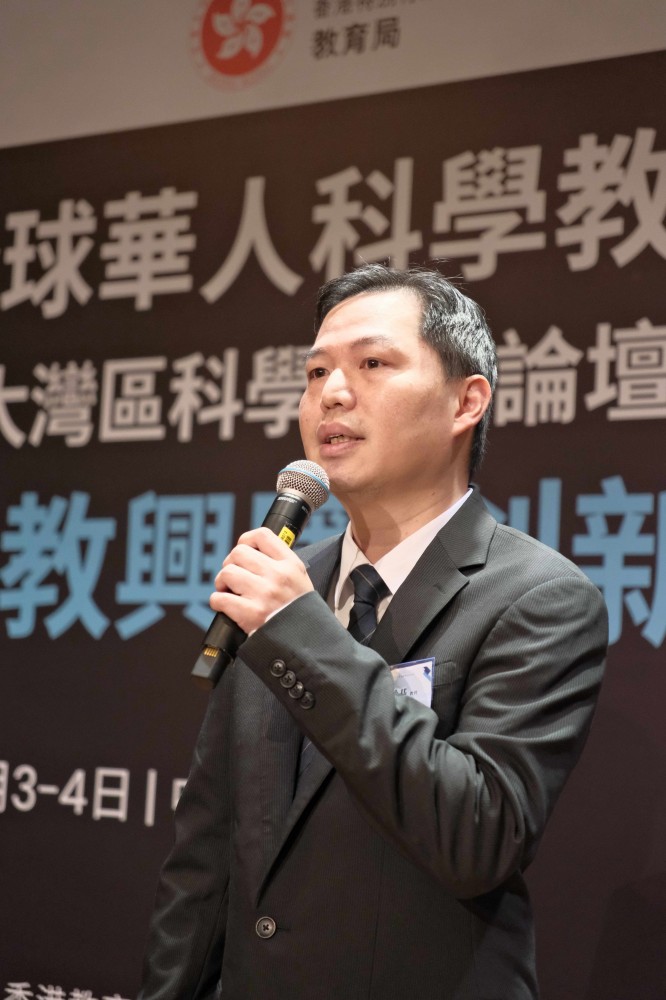GCASER 2025: the future of science unveiled
Over 400 experts, scholars, teachers, and educational researchers from around the world gathered to discuss the latest developments in science education research and reform at the 2025 Conference of the Global Chinese Academy (the Academy) for Science Education Research (GCASER). The conference, cohosted by the Department of Science and Environmental Studies (SES) and the Department of Curriculum and Instruction (C&I), took place at the University’s Tai Po Campus on 3 and 4 January 2025. Titled “Sustainable Science Education: Shaping a Better Future”, the conference marked the Academy’s inaugural academic conference since its establishment.
The conference was supported by the Education Bureau of the Hong Kong Special Administrative Region Government, the University of Hong Kong, the Chinese University of Hong Kong, the Hong Kong Federation of Education Workers, the Hong Kong Association for Science and Mathematics Education, and the Guangdong-Hong Kong-Macao University Alliance for Primary and Secondary STEAM Education.
Dr Sze Chun-fai, Acting Secretary for Education, officiated at the opening ceremony. In his speech, he highlighted that 2024 was a significant year for local science education reforms in Hong Kong. He noted that with the introduction of the primary science curriculum, the launch of junior secondary STEAM learning modules, and the updating of the junior secondary science curriculum framework, the Bureau aims to enhance students’ scientific literacy and foster an innovative spirit. Furthermore, the Bureau seeks to strengthen the implementation of a coherent science education foundation spanning nine years.
In his welcoming speech, Professor John Lee Chi-Kin, President of EdUHK, expressed hope that the conference would facilitate exchanges between Hong Kong scholars and Chinese educators worldwide regarding the forefront developments in science education. Additionally, it served as an opportunity to showcase the development journey, unique advantages, and future vision of science education in Hong Kong to global educational colleagues.
Professor Hu Weiping, President of the Global Chinese Academy for Science Education Research, explained that the Academy aims to provide a collaborative exchange platform for Chinese science education researchers worldwide, strengthening connections among them and enhancing the level of science education research within the Chinese community.
Chinese societies have seen a new wave of science curriculum reforms, as educators and policymakers strive to address the challenges of the increasingly uncertain 21st century.

“In recent years, Chinese societies have seen a new wave of science curriculum reforms, as educators and policymakers strive to address the challenges of the increasingly uncertain 21st century. As a prominent event in the field of science education research scholar for Chinese learners, GCASER 2025 aims to provide a platform for Chinese science education scholars worldwide to share their insights and inform the current wave of science education reform,” said Professor Keith Ho Wing-kei, Head of SES and a co-chair of the conference organising committee.
Professor May Cheng May-hung, Vice President (Academic) of EdUHK, Chair of the Guangdong-Hong Kong-Macao University Alliance for Primary and Secondary STEAM Education, and former President of the East Asian Association for Science Education, stated in her welcoming remark that strengthening cross-regional cooperation and exchange is crucial to seize the opportunities and challenges of the new era. It is believed that this conference will further deepen dialogue and mutual learning in the field of science education.
The two-day conference featured keynote speeches, parallel sessions, the Greater Bay Area Forum, teacher workshops, and booth exhibition. During the keynote speech sessions, Professor Winnie So Wing-mui, a professional advisor to SES, along with speakers from various universities, including Professors Hu Wei-ping, Bao Lei, Chiu Mei-Hung, Tan Aik Ling, Wei Bing, Zhang Hongshia, Zhou Guoqiang, and Li Chunmi, presented the latest advancements in science education theory.
In the parallel sessions, over 100 scholars from around the world shared their latest research findings on hot topics such as the application of AI in science education, STEM education, and fostering scientific creativity. The Head of SES Professor Keith Ho Wing-kei and Dr Peter Wan Zhihong from C&I co-chaired the conference organising committee. Other academic and teaching staff from the two departments, including Professor Bill Yeung Chi-ho, Dr Sarah Lee Hoi-man and Ms Agnes Man Mei-sum from SES, contributed to various sub-committees of the conference.
Three primary schools—Kowloon City Baptist Church Hay Nien (Yan Ping) Primary School, Man Kwan Pak Kau College, and Lok Sin Tong Leung Kau Kui Primary School (Branch) —along with a team of pre-service teachers from the University’s mentorship scheme, and tech companies Fotis Laboratory and MuseLab, participated in the booth exhibition. Their representatives showcased their STEM inventions to conference visitors.
The conference was supported by the Education Bureau of the Hong Kong Special Administrative Region Government, the University of Hong Kong, the Chinese University of Hong Kong, the Hong Kong Federation of Education Workers, the Hong Kong Association for Science and Mathematics Education, East Asian Association for Science Education, and the Guangdong-Hong Kong-Macao University Alliance for Primary and Secondary STEAM Education.
Click here for details of the GCASER 2025 conference.




